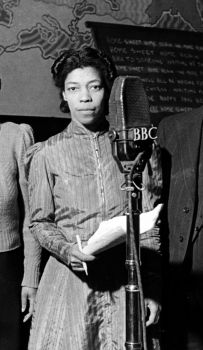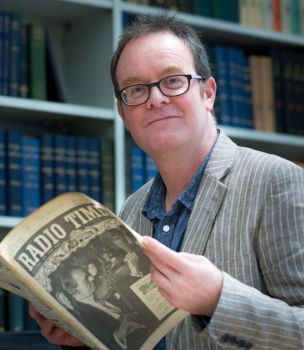Hidden history of BBC response to Britain's increasing cultural diversity revealed in new digital history project
By: Neil Vowles
Last updated: Friday, 1 November 2019

Una Marson, the BBC's first ever black producer. Picture courtesy of the BBC.

The “hidden history” of how the BBC has responded to Britain's increasing cultural diversity and the nation's changing place in the world has been revealed in the latest edition of a commemorative project marking the broadcaster's first 100 years.
The newly launched website, the fourth in the '100 Voices that Made the BBC' series, explores how the broadcaster has tried to re-imagine itself in the multicultural and post-imperial age. It has been published to coincide with the 70th anniversary of the arrival of the Empire Windrush and the King’s formal renunciation of the title of Emperor of India.
The 'Connected Histories of the BBC' project, which launched in April last year and which will run for nearly five years in the lead-up to the Corporation’s centenary in 2022, is being curated by Professor David Hendy and colleagues from the Sussex Humanities Lab at the University of Sussex.
Professor Hendy, a Professor of Media and Cultural History at the University of Sussex, said: “This has turned out to be a genuinely fascinating, even revelatory part of our research project.
"When we began, it was hard to get a clear sense of how the BBC has engaged with issues of race, immigration, and national identity over the years: it's a largely hidden part of the Corporation's history.
"Unearthing long-forgotten programmes from the BBC's vaults, and getting a first look at recorded oral history interviews with key BBC personnel, has helped us to flesh out that story, and reveal some hidden gems.”
The People, Nation, Empire website includes a large number of clips from programmes not seen since they were first broadcast several decades ago, as well as lots of interview recordings, photographs and written documents that are being made publicly available for the very first time.
Visitors to the new site can view BBC news bulletins from the day the Empire Windrush arrived in 1948, documents from the Mass Observation Archive revealing British attitudes about race and immigration since 1939, the earliest known recording of the BBC’s first Black producer Una Marson and the very first episode of 'Make Yourself at Home', the BBC’s TV programme for Asian immigrants launched in 1965.
The archive also features clips from three completely new interviews filmed by the Connected Histories of the BBC team with key figures from the Corporation’s past including veteran India Correspondents Mark Tully and Satish Jacob. The interviews offer revealing new information about the role of the BBC in the reporting of the assault on the Golden Temple in Amritsar in 1984.
The website’s text has been written by Professor Hendy and Dr Alban Webb, lecturer in media and cultural studies at the University of Sussex, with guest contributions from other media historians, including University of Sussex PhD student Aasiya Lodhi and incoming British Academy Visiting Fellow Jeannine Baker. Additional contributions have been made by Professor James Procter at Newcastle University, Dr Jamie Medhurst of Aberystwyth University and BBC history manager John Escolme.
Professor Hendy said: "Given the current interest in the 'Windrush generation' and that lots of people are now questioning the legacy of Empire, we thought it would be useful to see just how the BBC has navigated such issues in the past.
"Britain's cultural diversity - and Britain's changing role in the world - are fascinating and important topics. But for a broadcaster such as the BBC, which is also a grand national institution, they pose real challenges: how can it ensure that some voices are not being systematically excluded, or portrayed in misleading ways? Put more simply: who gets to speak on air, and who doesn't?”
A launch event for People, Nation, Empire was held at the British Library last week.
